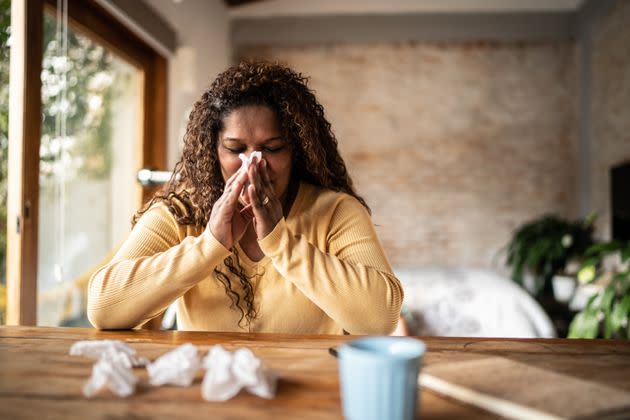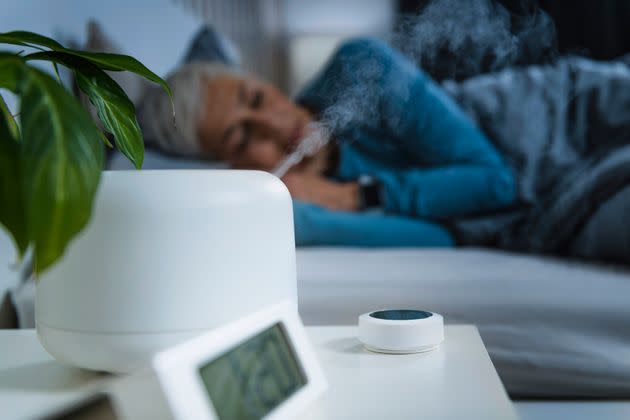This 1 Lifestyle Change Can Drastically Reduce Your Risk Of Catching A Cold

Science occasionally catches up to what our grandparents have been saying all along. Like when they warned you, “You’ll catch a cold out there!” when a chill is in the air. Technically, you can’t get sick from cold weather alone (the majority of colds are caused by viruses). However, there is one way that brisk temperatures can contribute to you getting sick — and you may not even realize you’re doing it.
Breathing in cold, dry air outside (or even in your home) can make you more susceptible to catching a cold. And it’s all because of the way our noses are set up to protect us.
“The nasal apparatus is designed to be the first step in fighting off infection and filtering out irritants in the environment,” said Dr. Amy Brown, a board-certified pulmonologist, assistant professor of pediatrics at New York Medical College School of Medicine, and an adjunct associate professor of public health at the School of Health Sciences and Practice.
“The nose has its own internal humidification system that allows it to adapt to changes in the external environment easily,” Brown said. “This role is critically important because it marks the beginning the delivery of fresh, clean, humidified air to the deepest part of our lungs.”
When the air outside the nose is too dry, it causes the nose to work harder to humidify the air you breathe in, and it can’t always keep up. Brown explained that when nasal filtration and immune defenses aren’t functioning optimally due to dry air, viruses — like those that cause respiratory infections and fall colds — can get in more easily. Not good if you want to avoid getting sick!
How Your Nose’s Defense System Gets Thwarted By The Cold Weather
Rhinologist and sinus surgeon Dr. Peter Hwang, head of the Stanford Sinus Center and SoundHealth founder, told HuffPost, “Healthy nasal function relies on both proper anatomy to enable good airflow and a well-hydrated mucus layer which helps to keep the nose humidified and clean.”
That mucus layer is exactly what it sounds like — a sticky, gooey layer of snot in the inner lining of the nasal cavity that acts as “a physical blockade for viruses and bacteria to enter the tissue andas an active immunologic organ,” Hwang explained.
It may sound gross, but because the nose’s job is to humidify and warm the air it breathes in, removing tiny airborne particles before they reach the lower airways, the mucus (or epithelial) layer is essential.
The nasal cavity also contains billions of cells called cilia that look like “microscopic finger-like projections which beat in unison [to] sweep mucus, bacteria and viruses away,” according to Dr. Peter Filip, a rhinologist, skull base surgeon and assistant professor in the Department of Otorhinolaryngology, Head and Neck Surgery at Rush University Medical Center.
All of those defenses are at risk when you have dry nasal passages.
When the temperature inside the nose drops by 9 degrees Fahrenheit, it impairs approximately 50% of the billions of the cells providing anti-viral immune defense function in your nostrils, according to a 2022 study in The Journal of Allergy and Clinical Immunology, per CNN.
Humidity drops when the weather cools, “which makes it harder for the nose to maintain this nice, humidified mucus layer,” Hwang said. (The air in your own home could be dryer-than-ideal too.) Not to mention, “a variety of viruses thrive” during the fall and winter months, which can irritate your nose’s protective layer, according to Filip.

Other Causes Of Dry Nose And Signs You’re Experiencing The Issue
Of course, it’s not just cold weather that can cause dry noses. Although the nose’s “wiring” can differ from person to person, according to Filip, other causes of a dry nose could be due to dehydration; nose picking; frequent shoving of tissues, Q-tips or foreign bodies into the nose; dry weather; allergies; many different medicines, such as oral decongestants, antihistamines, and certain medications for psychiatric conditions; and certain autoimmune diseases, which are a type of illness where the immune system attacks its own cells. Tobacco smoke, air pollutants, irritating fragrances/odors and allergens can also harm your nasal health, according to Brown. “If there are excessive amounts of irritants or infectious particles in the environment, the nose has to work harder on filtration and then also may not keep up with promoting ideal humidification which then leads to dryness,” she said. So, how do you know if your nose is dry? Our experts suggest looking for these signs: General nasal discomfort, soreness, itchiness or congestion
Thick mucus, which can lead to worsening congestion and discomfort
An altered sense of smell
Flaking skin, scabs, crusts
Dry yellow mucus
Bloody scabs or nosebleeds
The Best Thing You Can Do If You’re Experiencing Dry Nasal Passages — Especially During Cold And Flu Season
Plain and simple, you need to tackle the dry air and keep your nasal passages moist. This one lifestyle change could make a huge difference, according to experts.“Ensuring appropriate ideal humidity in your indoor dwelling space is really the key for ongoing, long-term relief,” Brown said. A humidifier can help if the environment is too dry but be careful — excessive indoor humidity can also make it harder to breathe and can lead to environmental mold growth, according to Brown.Find the perfect balance by ensuring the indoor humidity is approximately 35-45%.“If your nose is feeling dry, and it is associated with dry lips or dry skin, then that may be an indicator that your indoor setting is on the drier side,” Brown explained. For short-term relief, try a steam room, use saline-based over-the-counter nasal sprays, and avoid using scented items in your home. Staying hydrated is also crucial to “limit overall dryness,” according to Brown. Talk to your doctor if you are struggling with a dry nose for more recommendations. Runny noses are no fun, but dried-out noses present their own set of problems. You may not have realized that the air you breathe in your home or outside is making you more prone to catching a fall cold, but it can happen. By prioritizing your nose’s health and humidity ― along with taking virus prevention measures ― you can hopefully reduce your risk getting sick this season.

